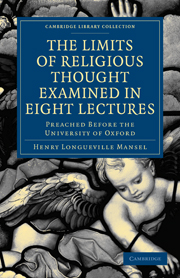 The Limits of Religious Thought Examined in Eight Lectures
The Limits of Religious Thought Examined in Eight Lectures Book contents
SUMMARY OF THE ARGUMENT
Published online by Cambridge University Press: 29 August 2010
Summary
It is assumed throughout the Lectures that human reason is capable of attaining to some conception of a Supreme Being, and that this conception will vary in intellectual elevation and moral purity according to the intellectual and moral condition of those by whom it is formed. This assumption is implied in the title, “The Limits of Religious Thought,” which supposes the existence of a religious thought to be limited, and is expressly asserted in the Second Lecture, p. 30. The further question to be considered is this: Granting that such conceptions exist, in various degrees of approximation to the truth, what is the highest point of elevation to which human philosophy, apart from Revelation, can raise them; and what is the nature of the assistance afforded by Revelation when given? Are such conceptions, in their highest form, exact representations of the absolute nature of God, so that the theological conclusions to which they lead are entitled to be accepted as scientific certainties? or are they merely approximate representations, founded on analogy, not on exact resemblance, and leading to conclusions which, however reasonable as probabilities, and however valuable in the absence of more trustworthy information, are yet but one kind of probable evidence among many, whose exact value cannot be estimated till full account has been taken of all corroborative or conflicting evidences derivable from other sources?
- Type
- Chapter
- Information
- The Limits of Religious Thought Examined in Eight LecturesPreached before the University of Oxford, in the Year M.DCCC.LVIII on the Foundation of the Late Rev. John Bampton, pp. vii - xixPublisher: Cambridge University PressPrint publication year: 2009First published in: 1867
